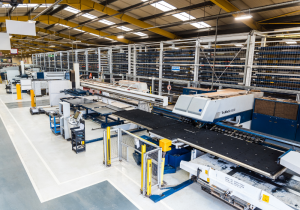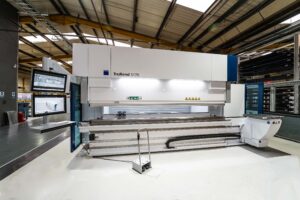Now more than ever, technology is developing at a rapid pace.
From artificial intelligence to automation – things have changed a lot since we first set up in 1989.
With ever-advancing technology and equipment in the 21st century, Alpha Manufacturing set out on an ambitious investment programme in 2015 to achieve high levels of factory automation.
Often referred to as Industry 4.0 and Smart Factories – the integration of intelligent digital technologies into manufacturing and industrial is game changing.
With a huge emphasis on digitalisation and the turning of physical tests or labour-intensive processes into virtual or digital forms, Industry 4.0 aims to add value, increase efficiency, and significantly reduce production timescales.

Why is automation so helpful in manufacturing?
Automation of manufacturing processes, in essence, is a powerful tool for optimising operations, reducing waste, and significantly enhancing efficiency.
It addresses many of the wastes, especially in process accuracy and quality, waiting, transportation, motion, and inventory. Alpha Manufacturing has a very clear vision of lean manufacturing, which has factory automation at its core.
So, how can the sheet metal process be automated?
Automated machine loading and unloading:
Many of Alpha Manufacturing’s current processing machines feature automated systems for loading and unloading raw materials and parts. This both reduces the time an operator spends manually loading and minimises any risk of injury.
Automated storage:
Systems such as STOPA use a system called ‘chaotic storage,’ which doesn’t require a pre-defined space for each item. Instead, it records each item as it passes into or out of storage and knows its exact location at any given moment.
Lights-out operation:
This effectively means that machines can be programmed and left unmanned to continuously process raw materials and parts. This has a huge positive impact on productivity and additionally allows for large volumes to be processed in a shorter time.
Alpha has invested in many industry-leading automation machines over the past few years, such as the Trumpf Robot Welder, Salvagnini Metal folder, the STOPA Storage System – which can store up to 600 tonnes of raw material and WIP, and even an automatic cardboard box maker!
As we move into the future, we are ready to embrace more automation technology, aligning with the growing trend of Industry 4.0. Our main aim is to benefit not only our colleagues but also our customers, ensuring that our products remain at the forefront of technological advancements.

How does the end customer benefit?
By optimising the manufacturing process and reducing waste while simultaneously improving reliability and accuracy, we are able to offer a much more efficient and cost-effective service overall.
The leaner the manufacturing process, the more value the customer gets, combined with more reliable and consistent service levels!
Will automation completely eliminate manual input in manufacturing?
In short, no, absolutely not!
By automating the traditional non-value-added tasks performed by a human (such as lifting, transporting and data processing), we are significantly boosting our productivity. This allows our workforce to focus on more value-added tasks such as performing manufacturing processes, and upskilling themselves, leading to a more efficient and dynamic manufacturing environment.
There will always be a need for human input in manufacturing, with automation being used to ensure this resource is best deployed for maximum production.